Unit 1 Know yourself Grammar 课件39张PPT
文档属性
| 名称 | Unit 1 Know yourself Grammar 课件39张PPT |

|
|
| 格式 | zip | ||
| 文件大小 | 408.3KB | ||
| 资源类型 | 教案 | ||
| 版本资源 | 牛津译林版 | ||
| 科目 | 英语 | ||
| 更新时间 | 2019-10-08 00:00:00 | ||
图片预览

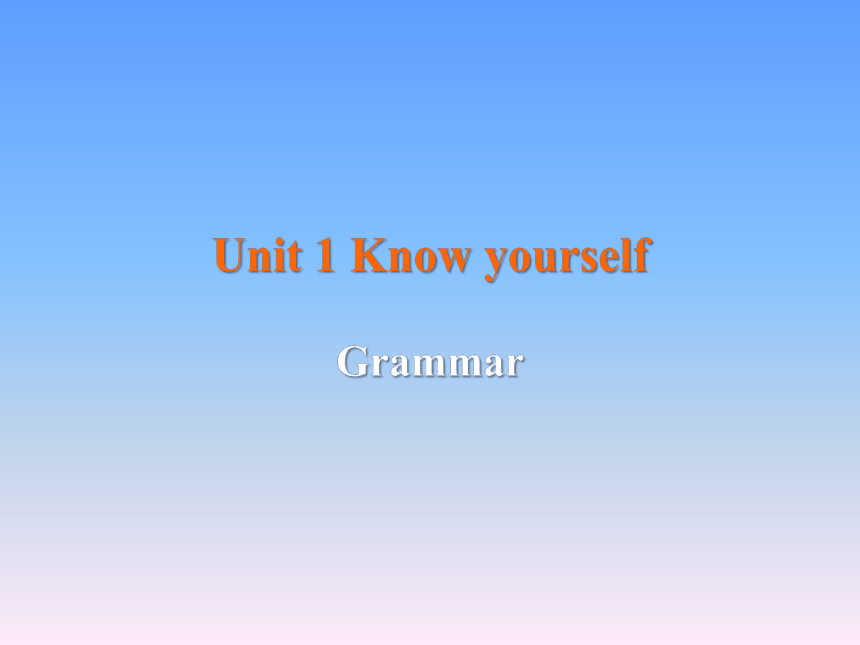
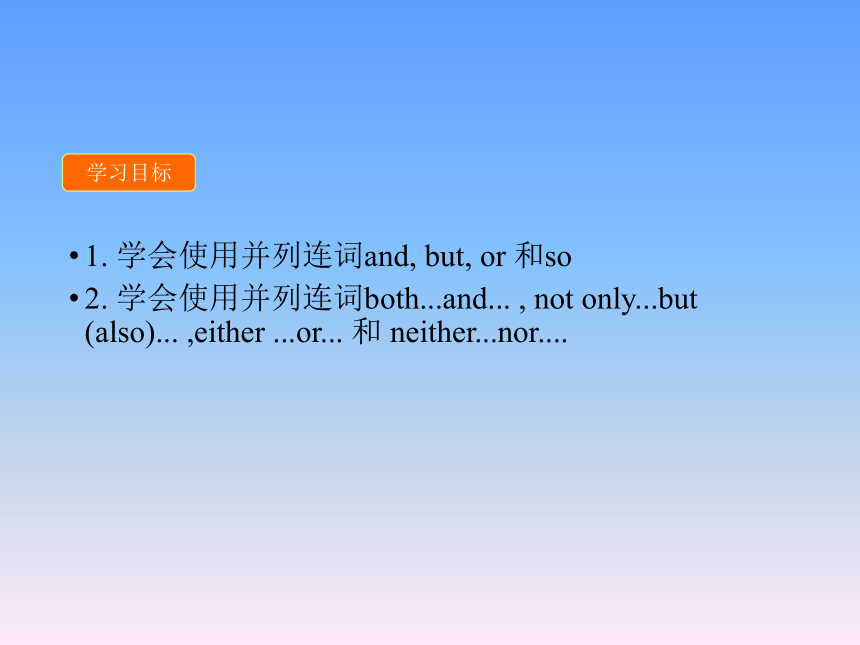
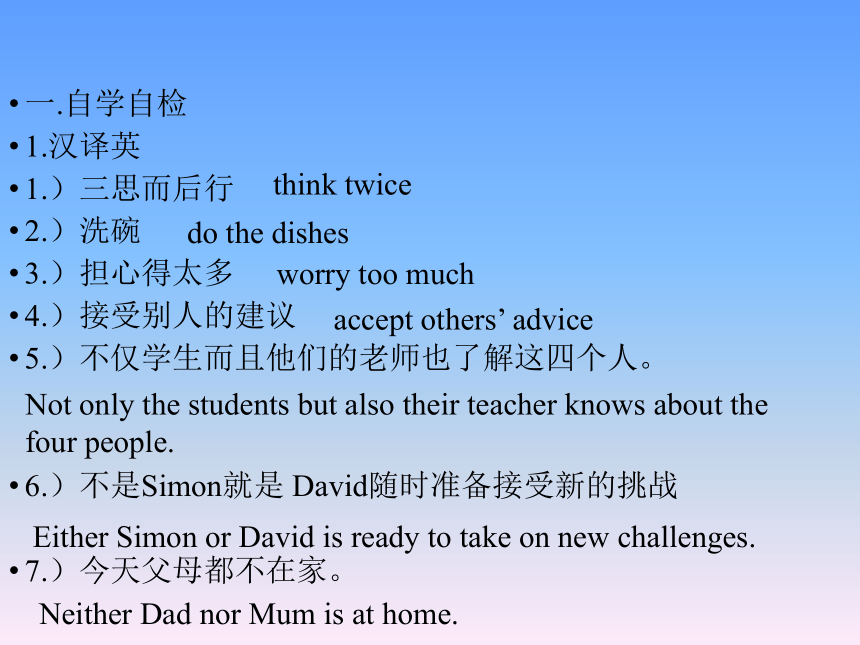
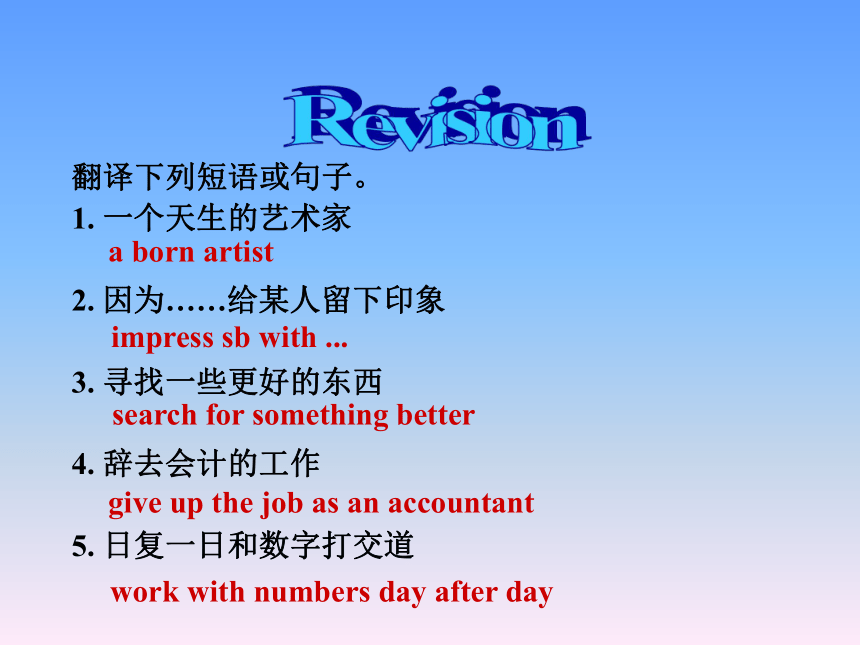
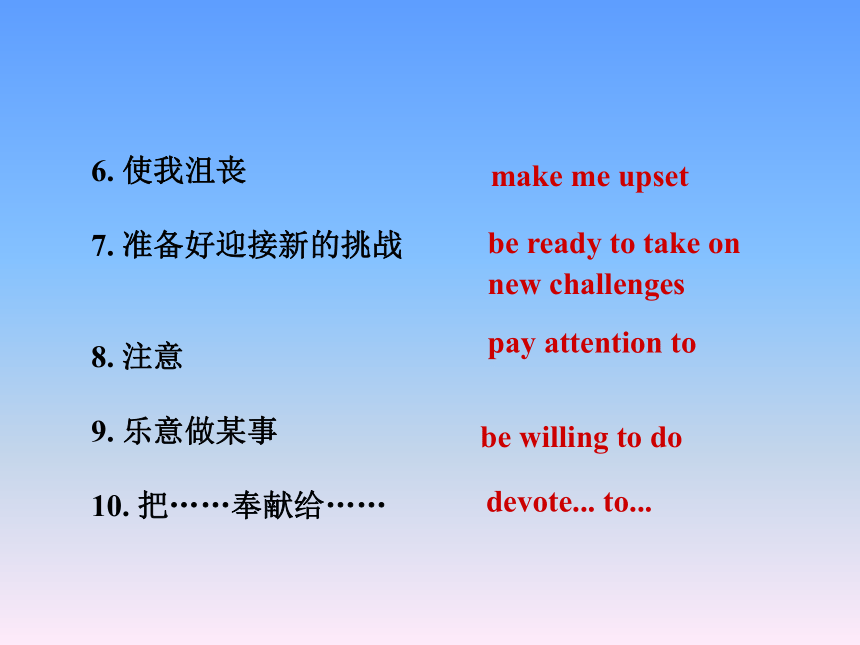
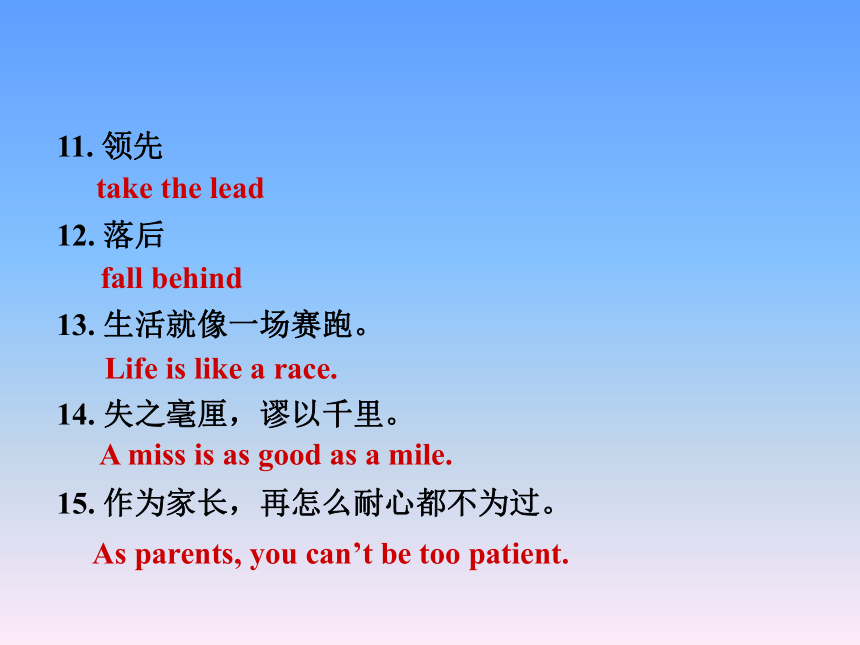
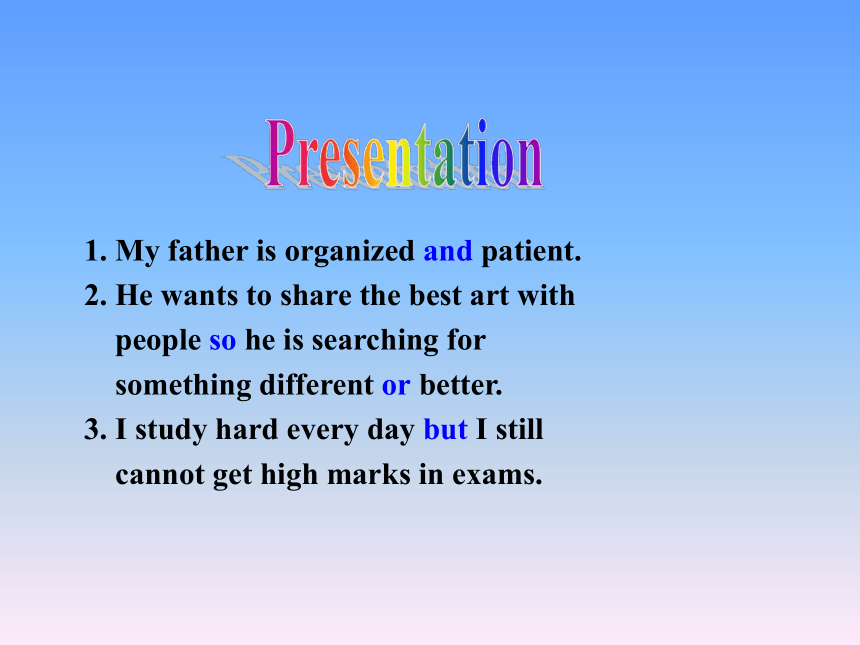
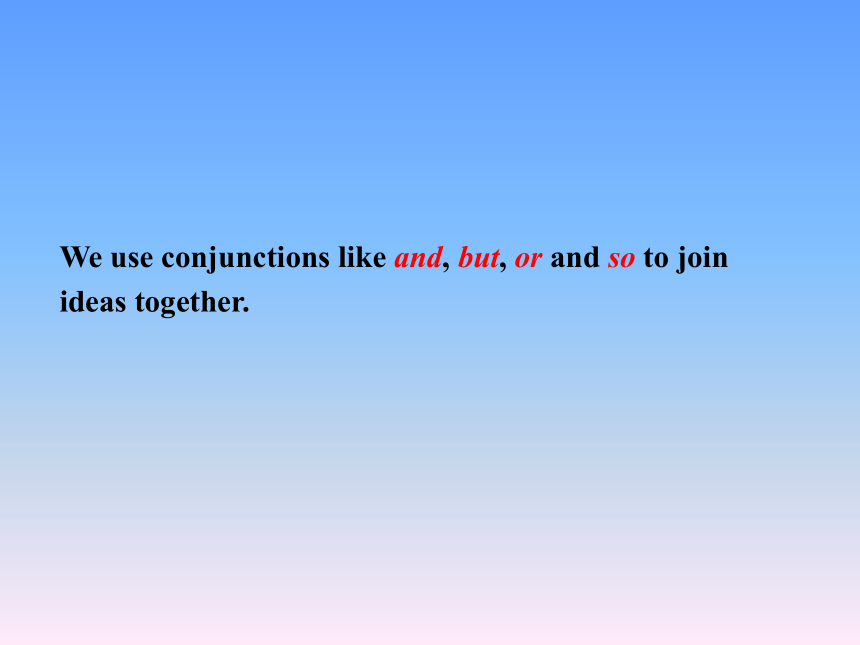
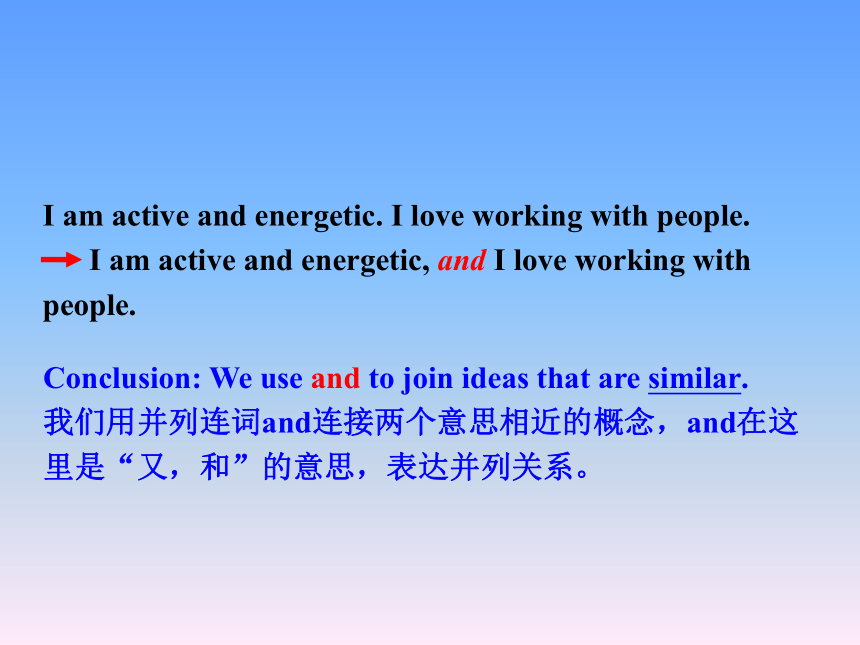
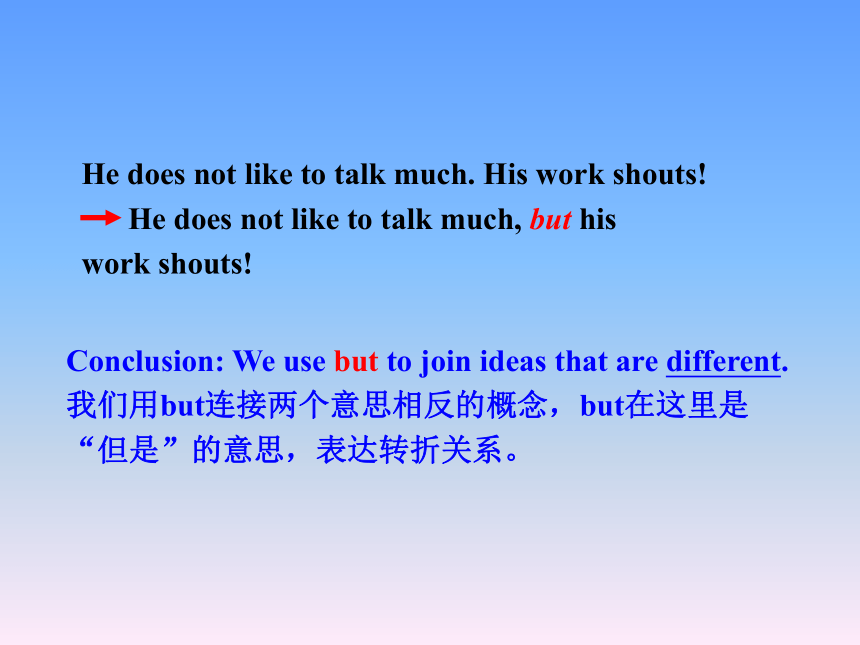
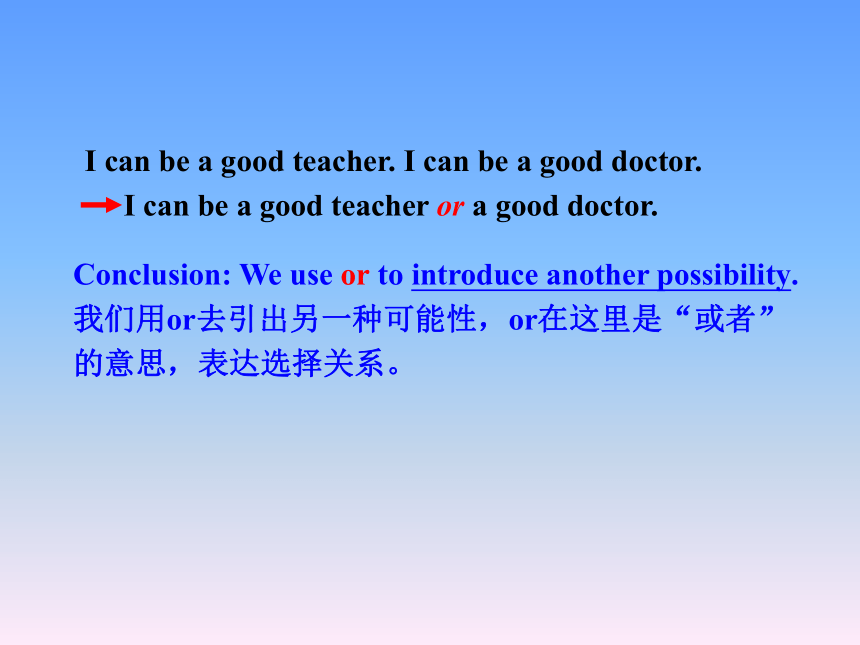
文档简介
课件39张PPT。教学课件
英语 九年级上册 译林版
Unit 1 Know yourself
Grammar1. 学会使用并列连词and, but, or 和so
2. 学会使用并列连词both...and... , not only...but (also)... ,either ...or... 和 neither...nor....学习目标一.自学自检
1.汉译英
1.)三思而后行
2.)洗碗
3.)担心得太多
4.)接受别人的建议
5.)不仅学生而且他们的老师也了解这四个人。
6.)不是Simon就是 David随时准备接受新的挑战
7.)今天父母都不在家。think twice do the dishesworry too muchaccept others’ adviceNot only the students but also their teacher knows about the four people.
Either Simon or David is ready to take on new challenges. Neither Dad nor Mum is at home.翻译下列短语或句子。
1. 一个天生的艺术家
2. 因为……给某人留下印象
3. 寻找一些更好的东西
4. 辞去会计的工作
5. 日复一日和数字打交道a born artistimpress sb with ...search for something bettergive up the job as an accountantwork with numbers day after dayRevision
6. 使我沮丧
7. 准备好迎接新的挑战
8. 注意
9. 乐意做某事
10. 把……奉献给……make me upsetbe ready to take on
new challengespay attention tobe willing to do devote... to...11. 领先
12. 落后
13. 生活就像一场赛跑。
14. 失之毫厘,谬以千里。
15. 作为家长,再怎么耐心都不为过。take the leadfall behindLife is like a race.A miss is as good as a mile.As parents, you can’t be too patient.1. My father is organized and patient.
2. He wants to share the best art with
people so he is searching for
something different or better.
3. I study hard every day but I still
cannot get high marks in exams.PresentationWe use conjunctions like and, but, or and so to join ideas together. I am active and energetic. I love working with people.
I am active and energetic, and I love working with people.Conclusion: We use and to join ideas that are similar.
我们用并列连词and连接两个意思相近的概念,and在这里是“又,和”的意思,表达并列关系。He does not like to talk much. His work shouts!
He does not like to talk much, but his
work shouts!Conclusion: We use but to join ideas that are different.
我们用but连接两个意思相反的概念,but在这里是“但是”的意思,表达转折关系。I can be a good teacher. I can be a good doctor.
I can be a good teacher or a good doctor.Conclusion: We use or to introduce another possibility.
我们用or去引出另一种可能性,or在这里是“或者”的意思,表达选择关系。In negative sentences, we use or to join two or more ideas. 在否定句中,我们用or连接两个或两个以上的概念。
He does not like singing. He does not like dancing.
He does not like singing or dancing.I want to share the best art with people.
I am always searching for something better
or different.
I want to share the best art with people, so I am always searching for something better or different.Conclusion: We use so to express the result of something.
我们用so去表达某件事的结果,so在这里是“因此,所以”的意思,表达因果关系。Millie wants to write about her classmates. Help her join her ideas with and, but, or or so. 小组合作1 Kitty is kind. Sometimes she is impatient.
___________________________________
2 Billy would not accept others’advice. Billy would not think twice.
____________________________________________Kitty is kind, but sometimes she is impatient.Billy would not accept others’ advice or think twice.adj. 不耐烦的,急躁的 三思而行3. Judy is gentle. Judy never gets angry with others.
__________________________________________
4. Suzy worries too much. She cannot sleep
well sometimes.
__________________________________________________Judy is gentle, and she never gets angry with others. Suzy worries too much, so she cannot sleep well sometimes. 1. I dislike not only coffee but also
Cola.
2. I like neither maths nor English.
3. You either take the lead or fall
behind.
4. Both Sandy and Millie have been to
Hong Kong.PresentationWe use conjunctions like both...and..., not only...but (also)..., either...or..., and neither...nor... to connect the same part of two sentences to avoid repetition.
我们用连词both…and…, not only…but also…, either…or…, neither…nor连接两个句子的相同部分以避免重复。 Kitty has known something about the
four people.
I have known something about the four
people.
Both Kitty and I have known something
about the four people.both...and... “……和……都,既……又……”。当both…and…连接两个成分在句中作主语时,谓语动词用复数。not only...but also... “不但……而且……;不仅……还有……”。当not only…but also…连接两个名词作主语时,其谓语动词应与最近的一个主语在人称和数上保持一致。 e.g. The parents like watching football
matches.
The three-year-old child likes
watching football matches.
Not only the parents but also the
three-year-old child likes watching
football matches.either...or... “要么……要么……;或者……或者……;不是……就是……”,用于连接两个表示选择关系的词。当either…or…连接两个主语时,其谓语动词应与最近的一个主语在人称和数上保持一致。 e.g. I am going there tomorrow.
You are going there tomorrow.
Either you or I am going there tomorrow.neither…nor… “既不……也不……”,具有否定含义。当neither…or…连接两个主语时,其谓语动词应与最近的一个主语在人称和数上保持一致。 e.g. Billy has not finished his homework.
Daniel has not finished his homework.
Neither Billy nor Daniel has finished
his homework.Amy’s family and classmates
Amy is writing about what her family does at the weekend. Help her complete the sentences with the correct conjunctions.小组合作1. _________ my dad ______ my mum
goes to work at the weekend. We visit my
grandparents on Saturdays.
2. _________ my mum ______ my grandma
are good at cooking. They cook lunch for
us.
3. _________ my mum _____ my dad does
the dishes after lunch. I also help with it.Neither norBoth andEither or4. In the afternoon, my grandpa and my dad
__________ play chess ____ chat
with each other.
5. My mum __________ helps clean
the rooms for my grandparents ________
does some shopping for them.either ornot only but alsoAmy and Suzy are talking about what jobs their classmates can do in the future. Complete their conversation with the correct conjunctions and the correct forms of the verbs in brackets.Amy: I’ve learnt about jobs and personalities
recently.
Suzy: Really? What jobs do you think our
classmates can do in the future?
Amy: I think Millie would make an excellent
teacher. She’s (1) _________ willing
to work with children _______ patient
with them.
Suzy: What about Simon?
Amy: He's active and good at playing football.
I think he can be (2) ______ a
PE teacher ____ a football player. not onlyorbut also either Suzy: Do you think David and Lisa can be
artists?
Amy: They’re very organized, but artists should
be creative. (3) _________ David’s _____
Lisa’s personality (4) ____ (be) suitable for
being an artist, I’m afraid.
Suzy: Who can be a manager?
Amy: (5) ______ Billy _____ Paul (6) ____ (be)
very confident and energetic. I think they
can be managers.Neither isBoth and are norSuzy: How can I learn about jobs and
personalities?
Amy: You can read about them
(7) ______ from some books ____
on the Internet.eitherorSummary
我们用并列连词and、but、or和so来连接单词、短语或句子。他们分别表示并列关系、转折关系、选择关系或因果关系。
e.g. The boy is not very tall but he runs very
fast.
I like playing football and running.
Is your friend a boy or a girl?
She is ill so she can’t go to school today.
注意:并列连词so和从属连词because不能一起使用。用于连接两个并列的主语、谓语、宾语、
表语、状语等用both...and...、not only...but also...、either...or...、neither...nor...。
e.g. Both New York and London have traffic
problems.
Not only Mr Zhang but also his son is an
engineer.
Either Ming or Dan is going to the USA on
business next month.
Neither Ming nor Dan is going to the UK
on business next month.— How can I wake up so early?
— Set the alarm at 5 o’clock, ________
you’ll make it.
A. but B. or C. and D. so C考查“祈使句 + and + 陈述句”句型,意为“如果……就……”。虽然or也可用于此句型,但or是“否则、要不然”之意,如:Work hard, or you'll fail. (努力学习,否则就会不及格。) ExercisesFor a person with reading habits, a
printed page contains not only words
________ ideas, thoughts and feelings.
A. yet B. and C. or D. but D考查not only ... but (also) ...,表示“不但……而且……”。合并句子。
方法指导:准确理解原句的意思--选好连接词――考虑主谓一致--保持时态一致。
1. All the pupils have read this storybook.
Their English teacher has read this storybook,
too.
________ all the pupils _______ their English
teacher _____ read this storybook.
2. Jack doesn’t know Mrs. White, and Helen
doesn’t know, either.
________ Jack _____ Helen _______ Mrs.
White. Not only but alsohasNeither nor knows3. You may lend him the computer. You may
buy him a new computer.
You may _______ lend him the computer
_______ buy him a new one.
4. I have been to Beijing. So has my mother.
_______ my mother _____ I have been to
Beijing.
5. I don’t go to the market in such a cold
weather. Neither does Alice.
_______ Alice _____ I ____ to the
market in such a cold weather. either
orBoth andNeither nor go1. Review the uses of conjunctions.
2. Finish the exercises in students’
workbooks.Homework
英语 九年级上册 译林版
Unit 1 Know yourself
Grammar1. 学会使用并列连词and, but, or 和so
2. 学会使用并列连词both...and... , not only...but (also)... ,either ...or... 和 neither...nor....学习目标一.自学自检
1.汉译英
1.)三思而后行
2.)洗碗
3.)担心得太多
4.)接受别人的建议
5.)不仅学生而且他们的老师也了解这四个人。
6.)不是Simon就是 David随时准备接受新的挑战
7.)今天父母都不在家。think twice do the dishesworry too muchaccept others’ adviceNot only the students but also their teacher knows about the four people.
Either Simon or David is ready to take on new challenges. Neither Dad nor Mum is at home.翻译下列短语或句子。
1. 一个天生的艺术家
2. 因为……给某人留下印象
3. 寻找一些更好的东西
4. 辞去会计的工作
5. 日复一日和数字打交道a born artistimpress sb with ...search for something bettergive up the job as an accountantwork with numbers day after dayRevision
6. 使我沮丧
7. 准备好迎接新的挑战
8. 注意
9. 乐意做某事
10. 把……奉献给……make me upsetbe ready to take on
new challengespay attention tobe willing to do devote... to...11. 领先
12. 落后
13. 生活就像一场赛跑。
14. 失之毫厘,谬以千里。
15. 作为家长,再怎么耐心都不为过。take the leadfall behindLife is like a race.A miss is as good as a mile.As parents, you can’t be too patient.1. My father is organized and patient.
2. He wants to share the best art with
people so he is searching for
something different or better.
3. I study hard every day but I still
cannot get high marks in exams.PresentationWe use conjunctions like and, but, or and so to join ideas together. I am active and energetic. I love working with people.
I am active and energetic, and I love working with people.Conclusion: We use and to join ideas that are similar.
我们用并列连词and连接两个意思相近的概念,and在这里是“又,和”的意思,表达并列关系。He does not like to talk much. His work shouts!
He does not like to talk much, but his
work shouts!Conclusion: We use but to join ideas that are different.
我们用but连接两个意思相反的概念,but在这里是“但是”的意思,表达转折关系。I can be a good teacher. I can be a good doctor.
I can be a good teacher or a good doctor.Conclusion: We use or to introduce another possibility.
我们用or去引出另一种可能性,or在这里是“或者”的意思,表达选择关系。In negative sentences, we use or to join two or more ideas. 在否定句中,我们用or连接两个或两个以上的概念。
He does not like singing. He does not like dancing.
He does not like singing or dancing.I want to share the best art with people.
I am always searching for something better
or different.
I want to share the best art with people, so I am always searching for something better or different.Conclusion: We use so to express the result of something.
我们用so去表达某件事的结果,so在这里是“因此,所以”的意思,表达因果关系。Millie wants to write about her classmates. Help her join her ideas with and, but, or or so. 小组合作1 Kitty is kind. Sometimes she is impatient.
___________________________________
2 Billy would not accept others’advice. Billy would not think twice.
____________________________________________Kitty is kind, but sometimes she is impatient.Billy would not accept others’ advice or think twice.adj. 不耐烦的,急躁的 三思而行3. Judy is gentle. Judy never gets angry with others.
__________________________________________
4. Suzy worries too much. She cannot sleep
well sometimes.
__________________________________________________Judy is gentle, and she never gets angry with others. Suzy worries too much, so she cannot sleep well sometimes. 1. I dislike not only coffee but also
Cola.
2. I like neither maths nor English.
3. You either take the lead or fall
behind.
4. Both Sandy and Millie have been to
Hong Kong.PresentationWe use conjunctions like both...and..., not only...but (also)..., either...or..., and neither...nor... to connect the same part of two sentences to avoid repetition.
我们用连词both…and…, not only…but also…, either…or…, neither…nor连接两个句子的相同部分以避免重复。 Kitty has known something about the
four people.
I have known something about the four
people.
Both Kitty and I have known something
about the four people.both...and... “……和……都,既……又……”。当both…and…连接两个成分在句中作主语时,谓语动词用复数。not only...but also... “不但……而且……;不仅……还有……”。当not only…but also…连接两个名词作主语时,其谓语动词应与最近的一个主语在人称和数上保持一致。 e.g. The parents like watching football
matches.
The three-year-old child likes
watching football matches.
Not only the parents but also the
three-year-old child likes watching
football matches.either...or... “要么……要么……;或者……或者……;不是……就是……”,用于连接两个表示选择关系的词。当either…or…连接两个主语时,其谓语动词应与最近的一个主语在人称和数上保持一致。 e.g. I am going there tomorrow.
You are going there tomorrow.
Either you or I am going there tomorrow.neither…nor… “既不……也不……”,具有否定含义。当neither…or…连接两个主语时,其谓语动词应与最近的一个主语在人称和数上保持一致。 e.g. Billy has not finished his homework.
Daniel has not finished his homework.
Neither Billy nor Daniel has finished
his homework.Amy’s family and classmates
Amy is writing about what her family does at the weekend. Help her complete the sentences with the correct conjunctions.小组合作1. _________ my dad ______ my mum
goes to work at the weekend. We visit my
grandparents on Saturdays.
2. _________ my mum ______ my grandma
are good at cooking. They cook lunch for
us.
3. _________ my mum _____ my dad does
the dishes after lunch. I also help with it.Neither norBoth andEither or4. In the afternoon, my grandpa and my dad
__________ play chess ____ chat
with each other.
5. My mum __________ helps clean
the rooms for my grandparents ________
does some shopping for them.either ornot only but alsoAmy and Suzy are talking about what jobs their classmates can do in the future. Complete their conversation with the correct conjunctions and the correct forms of the verbs in brackets.Amy: I’ve learnt about jobs and personalities
recently.
Suzy: Really? What jobs do you think our
classmates can do in the future?
Amy: I think Millie would make an excellent
teacher. She’s (1) _________ willing
to work with children _______ patient
with them.
Suzy: What about Simon?
Amy: He's active and good at playing football.
I think he can be (2) ______ a
PE teacher ____ a football player. not onlyorbut also either Suzy: Do you think David and Lisa can be
artists?
Amy: They’re very organized, but artists should
be creative. (3) _________ David’s _____
Lisa’s personality (4) ____ (be) suitable for
being an artist, I’m afraid.
Suzy: Who can be a manager?
Amy: (5) ______ Billy _____ Paul (6) ____ (be)
very confident and energetic. I think they
can be managers.Neither isBoth and are norSuzy: How can I learn about jobs and
personalities?
Amy: You can read about them
(7) ______ from some books ____
on the Internet.eitherorSummary
我们用并列连词and、but、or和so来连接单词、短语或句子。他们分别表示并列关系、转折关系、选择关系或因果关系。
e.g. The boy is not very tall but he runs very
fast.
I like playing football and running.
Is your friend a boy or a girl?
She is ill so she can’t go to school today.
注意:并列连词so和从属连词because不能一起使用。用于连接两个并列的主语、谓语、宾语、
表语、状语等用both...and...、not only...but also...、either...or...、neither...nor...。
e.g. Both New York and London have traffic
problems.
Not only Mr Zhang but also his son is an
engineer.
Either Ming or Dan is going to the USA on
business next month.
Neither Ming nor Dan is going to the UK
on business next month.— How can I wake up so early?
— Set the alarm at 5 o’clock, ________
you’ll make it.
A. but B. or C. and D. so C考查“祈使句 + and + 陈述句”句型,意为“如果……就……”。虽然or也可用于此句型,但or是“否则、要不然”之意,如:Work hard, or you'll fail. (努力学习,否则就会不及格。) ExercisesFor a person with reading habits, a
printed page contains not only words
________ ideas, thoughts and feelings.
A. yet B. and C. or D. but D考查not only ... but (also) ...,表示“不但……而且……”。合并句子。
方法指导:准确理解原句的意思--选好连接词――考虑主谓一致--保持时态一致。
1. All the pupils have read this storybook.
Their English teacher has read this storybook,
too.
________ all the pupils _______ their English
teacher _____ read this storybook.
2. Jack doesn’t know Mrs. White, and Helen
doesn’t know, either.
________ Jack _____ Helen _______ Mrs.
White. Not only but alsohasNeither nor knows3. You may lend him the computer. You may
buy him a new computer.
You may _______ lend him the computer
_______ buy him a new one.
4. I have been to Beijing. So has my mother.
_______ my mother _____ I have been to
Beijing.
5. I don’t go to the market in such a cold
weather. Neither does Alice.
_______ Alice _____ I ____ to the
market in such a cold weather. either
orBoth andNeither nor go1. Review the uses of conjunctions.
2. Finish the exercises in students’
workbooks.Homework
